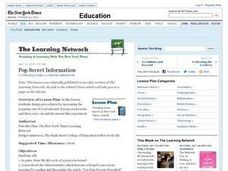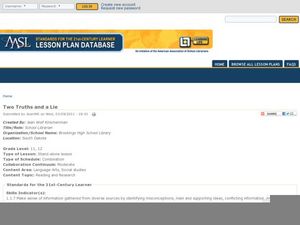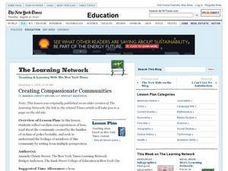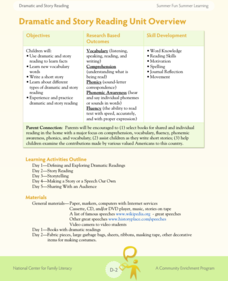Stanford University
Edward Curtis Photographs
A picture is worth a thousand words. The photos of Edward Curtis capture the life and culture of Native American Tribes during the early part of the twentieth century. A presentation first gives background information on Edward Curtis...
Scholastic
Stressed Out?
Provide tweens and teens with information they need to know about stress with an article that details how stress affects various organs in the body. The article also offers tips for healthy ways to cope with stress.
EngageNY
Grade 9 ELA Module 2, Unit 3, Lesson 5
After rereading the full text of Walter Mosley's essay "True Crime," groups complete an evidence collection tool worksheet, and then class members independently draft a multi-paragraph, evidence-based response that identifies how Mosley...
Curated OER
Encouraging Writing Through Combined Photos
Young scholars practice writing skills through using photography to help create a writing prompt. They investigate how images can be used to create new ones that related to each other. This is similar to making a collage except now the...
Curated OER
Pop Secret Information
Students design procedures for increasing the popping rate of a set amount of popcorn kernels. They propose and test a "secret" addition to the corn popping procedure which they expect would increase the popping rate and then write lab...
Curated OER
Controlled Narrative Writing
Young scholars add details to their narratives. In this narrative writing instructional activity, students look at a simple four sentence narrative and add adjectives and adverbs to make it more descriptive. They do this activity whole...
Curated OER
Cradles of Civilization Information Sheet
In this early civilizations learning exercise, learners read 4 paragraphs about great river civilizations and then label them Nile, Tigris and Euphrates, Indus, and the Huang He River Civilizations. Student also complete a writing prompt...
Curated OER
Common Phrases
While the exact purpose of this resource is difficult to discern, teachers could use this presentation with a list of common phrases, such as you will see, as discussion starters or as a type of writing prompt. The phrases found in this...
Curated OER
Exploring Owls
What can young scientists discover from dissecting an owl pellet? Explore the owl food chain, beginning with an introduction to these predatory birds. Suggested strategies here include creating a podcast and purchasing a poster, however...
Curated OER
Picture This
A unique writing lesson, this plan begins with learners talking about multiculturalism in small groups. Each learner will choose a picture from a newspaper, describe it to their small group, and think about how it relates to...
Curated OER
Fast Fact-Finding
Ever wonder why the sky changes color so often? Readers examine an informational excerpt from John Farndon's How the Earth Works. They underline key points as they read and then answer five response questions. Prompts review main points,...
Curated OER
Budget Busters
Use this economic activity to focus on writing summaries of informational text. First, middle schoolers define common economic terms used to describe news about the economy. They closely read news about the federal budget deficit and...
Curated OER
Two Truths and a Lie: Internet Research Skills
It's tough for high schoolers to assess what is a credible resource and what is not. A helpful resource prompts class members to research a particular topic and record two facts—and create one lie—while documenting the sources. They then...
Curated OER
Creating Compassionate Communities
Have you ever lost someone? Middle and high school learners journal about a time they experienced the loss of someone through death, divorce, moving, or another type of change. They share their responses and discuss an article relating...
National Center for Families Learning
The Summer Fun Summer Learning Poetry Unit
Focus on poetry this summer to enhance those comprehension, fluency, and language skills with a set of resources intended to explore different types of poetry, specifically lyric poetry. The daily activities contain differentiation ideas...
Facebook
Online Presence
What happens when an online post gets the wrong kind of attention? Learners evaluate the good, the bad, and the occasionally ugly side of social media posting with a instructional activity from a vast digital citizenship series. After...
Channel Islands Film
A Time Capsule of a Lost Early California Lifestyle
After viewing The Last Roundup, a documentary that examines the transitioning of Santa Rosa from a privately owned island to a National Park, class members adopt the point of view of Tim Vail, a member of the family that once owned the...
Curated OER
Validating Votes
Explore the discrepancies in Florida's vote counting process in 2000 and 2002 with this New York Times reading lesson. Middle schoolers study the viewpoints presented in informational text, paying attention to how word choice can...
Curated OER
A Way with Words
How do facts and opinions impact the news? After reading "How to Cover a War" from the New York Times, middle schoolers evaluate the claims in the article. They also consider the media's responsibilities in reporting during wartime....
Curated OER
Fact vs. Opinion (Part II)
How can you tell the difference between fact and opinion? Using newspapers, learners determine which articles contain statements of fact, and which articles reflect the writer's opinion. The lesson plan includes a discussion format and a...
Curated OER
Introduce Vocabulary: Dinosaur Bones (Barner)
Dig into some prehistoric vocabulary in Bob Barner's informative book Dinosaur Bones. This works best if you introduce the primitive words before reading the story. These are the focus terms in the text: ancient, climate, extinct,...
National Center for Families Learning
The Summer Fun Summer Learning Dramatic and Story Reading Unit
What's the difference between story reading and story telling? Participants in a summer enrichment program learn all about the difference as they listen to famous speeches, engage in dramatic readings, and craft their own short stories...
EngageNY
Grade 10 ELA Module 3: Unit 1, Lesson 11
Have you had a change of heart? Scholars consider whether their views change after gaining new information about tissue ownership. They read John Moore's court hearings and respond to a quick write prompt, noting if the new information...
Curated OER
Applying KWL Guides to Sources with Elementary Students
What is a KWL chart? Here is a well thought-out lesson that has learners use KWL charts to gain historical perspective. Your class examines primary sources about historical events and identifies what they know, want to know, and,...

























